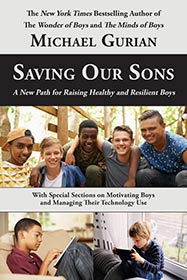
The title metaphor of Michael Gurian’s new book, The Stone Boys, represents boys who must become as hard as stone to survive. Traumatized boys and men are especially prone to becoming hardened for many reasons, some neuro-biological and some psycho-sociological. Traumatized girls and women can become hardened, too, but after trauma, they often engage and disengage with life and learning in somewhat different ways than boys.
Dr. Glynetta “Fletch” Fletcher will provide a Sunday morning keynote on trauma-informed educational strategies at our Gurian Summer Virtual Training Summit in June. Please see https://gurianinstitute.com/events/gurian-summer-institute-2020/ for information and to register. We hope you’ll join us for our Tele-Summit/Summer Training to hear Michael speak on Saturday and Dr. Fletcher on Sunday. Both will discuss trauma. Here’s more from Michael.
I hope you will take the ACEs (Adverse Childhood Experiences) test. You can do it quickly and easily by googling “ACE.” Various sites will show up for you. Dr. Fletcher, who will speak on trauma-informed educational strategies on Sunday, has taken the test, and as she recently said, “I score a ten. That is a very high score but a lot of people in the African American community score tens. That should give us pause.” Please learn more about Dr. Fletcher on www.gurianinstitute.com/trainers/, and see our GI blog, The Long Walk Home on www.gurianinstitute.com, which refers specifically to this point.
I have taken the ACEs test, as well. A victim of child abuse, sexual abuse, significant bullying and other trauma, I score a 7 on ACE. I didn’t know about ACE when I was a teen, but for about a decade (16 to 26), I was in therapy consistently. Since my marriage to Gail at 28-years-old, I have been in therapy sporadically and for the last 30 years I’ve been in a men’s support group consistently. As a childhood trauma survivor, I believe in the therapeutic process for all of us who have experienced significant trauma, even someone like me who is now 62.
If you wonder whether kids in your classrooms have experienced trauma, ACE will help you to talk with them and discern what has happened or may be happening. Let me also provide a further tool here, a checklist of relational signs of trauma. If a student/child/adult fits three or more of these signs, you may need to look carefully at past or present trauma with that person.
1. Alienation. Students and people who have unresolved trauma may gradually isolate themselves from people who love and care about them. Within this isolation may be hidden or obvious depression and anxiety disorders.
2. Anger. Trauma survivors often lash out until we wonder, “Why is this child suddenly (or gradually) so angry?” If you have noticed a particular child or teen becoming increasingly angry, trauma may be a cause.
3. Hyper-vigilance. Trauma often creates a brain response of hyper-vigilance to stimuli and against intimacy. This can become an anxiety disorder that gradually bleeds into relationships, including with teachers and parents. This child will often over-react to things.
4. Excessive Blaming. Traumatized children often blame other people for issues in their lives, covering up feelings of helplessness and self-blame. This can turn into bullying of others who are different, weak, or even dominant. If you have seen a child go from non-bully to bully over the last few months, trauma may be a cause.
5. Imposter Syndrome. The traumatized child may feel like an imposter, never good enough, never adequate, never able to love and be loved in ways that have permanence; unable to fit anywhere–this feeling may drive him or her to succeed in some areas of life, but hinder strong self-development throughout life.
7. Sexual difficulties. As teens and adults become sexual with one another, trauma can show up in sexual addiction, porn addiction, and/or early promiscuity that begin to take hold in their adolescence. In today’s screen-based world, porn addiction can start quite early.
8. Post-Traumatic Stress. Traumatized children and teens may show some exterior signals of PTS, e.g. difficulty sleeping, suicidal thoughts and behavior, or self-harm (self-cutting, obsessions with body image, and body dysmorphia are more common among girls) and/or dissociative episodes that sometimes involve flashbacks but not always.
9. Gender Dysphoria. While some people are arguing in the press and media these days that gender dysphoria does not exist, it does. The dysphoric child or adolescent is often triggered into dysphoria by trauma. He or she can feel, especially as an adolescent and emerging adult, significant confusion about sexuality, gay/lesbian questions, trans questions, and more.
10. Faking it. Some traumatized children and adolescents are very good at deceiving us as to their mental health. We think they are doing fine until they attempt to take their own life or another life.
If you know someone who significantly fits three of these, it may be time to question the child or the adults in his/her life about potential trauma.
The Brain and Trauma
The two crucial strategies we can use in living with, counseling, teaching, and helping traumatized children involve observation and assumption. I follow these in my counseling practice, and each was helpful to me earlier in my life when counselors and mentors helped me heal from my own childhood trauma.
Step 1: Observe the symptoms I’ve listed above in the person’s life, self-portrayal, or portrayal by others (e.g. parents, teachers, coaches, peers). In working with a traumatized person—in being fully trauma-informed in my counseling—I talk with not just the person in therapy, but the people who love this person. Give these people the 10 signs of trauma I’ve provided in this blog so they can use those to discern and discuss the child’s welfare, then discuss the signs of trauma in a customized way with them–a way that fits the particular child or adult.
Step 2. Assume the brain has been re-wired. The human brain, while naturally resilient, is fragile in the face of prolonged trauma because prolonged trauma “re-wires” the brain via cortisol (stress hormone) increase. The rise in cortisol is accompanied by rises or drops testosterone, oxytocin, vasopressin, and many other hormones. As this neurochemistry floods and spasms, areas of brain development get missed and other areas amplified.
For instance, pathways important for easy and fluid relationships with you as teacher, parent, or peer—pathways between the limbic system and frontal lobe (prefrontal, orbitofrontal)—may not get the development they need during trauma. The child may become an “adult” chronologically, but is set up to have feelings, emotions, angers, hatreds, fears, risk-urges, impulses, and other experiences in the amygdala (aggression, anger, fight or flight center) that do not get fully vetted by the executive parts of the brain. The diminished linkage can lead to errors throughout life, especially in relationships.
This diminished linkage is a primary reason males who have been traumatized are more likely than similar females to physically hurt and kill others. Even in utero, the female brain connects the mid-brain to the executive/top of the brain, while in utero the male brain is behind in these connections and is generally behind in these connections throughout life. Thus, throughout the lifespan, female fail-safes for executive decision-making and impulse control outshine males’ in the aggregate. Trauma can exacerbate all of this.
The flip side of this appears in the female brain as females who have been traumatized often turn against themselves. While they can become nasty and mean, of course, because the female brain is already prone to greater internal rumination than the male, females tend to become more obviously depressed and anxious, and when they do harm, they more often harm themselves through self-cutting, suicide attempts not meant to succeed but call attention to distress, and negative body- and self-image that debilitates them, and gender dysphoria.
Because male and female brains are part of the larger trauma-puzzle, being trauma-informed as adults and directly helping traumatized children can depend on our understanding how these brains are working. I hope you’ll join us at our Summer Institute for much more on this very important subject. To learn more and to register, please visit: https://gurianinstitute.com/events/gurian-summer-institute-2020/. Thank you.
–Michael Gurian









